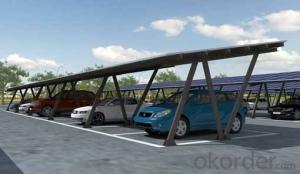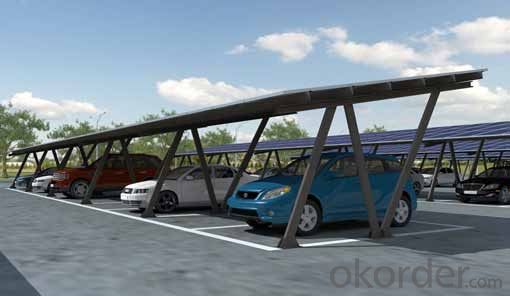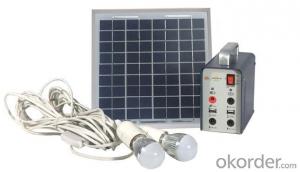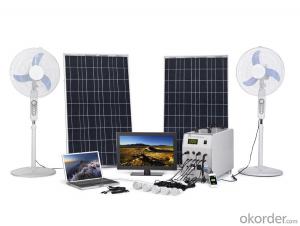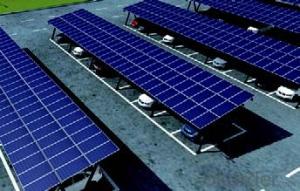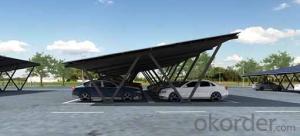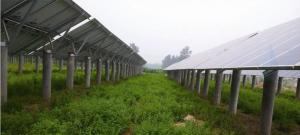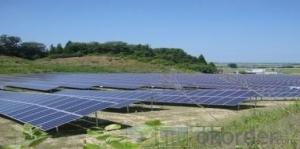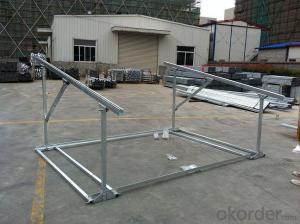Florida Solar Energy Systems Solar Mounting Carport System
- Loading Port:
- China Main Port
- Payment Terms:
- TT OR LC
- Min Order Qty:
- -
- Supply Capability:
- -
OKorder Service Pledge
Quality Product, Order Online Tracking, Timely Delivery
OKorder Financial Service
Credit Rating, Credit Services, Credit Purchasing
You Might Also Like
Product Features
• No location limitation
• Simple structure, easy & quick installation
• Use standard components, low maintenance cost
• Easy to be packaged, minimized transportation cost
• Removable & reusable
• With waterproof & non-water proof solutions for choice
• Customization available
- Q: Can a solar energy system be installed on a tile roof?
- Yes, a solar energy system can be installed on a tile roof. However, it may require additional considerations and precautions compared to other types of roofs. Tile roofs are often more fragile and delicate than other roofing materials, so special care must be taken during the installation process to avoid damaging the tiles. This may involve hiring experienced and skilled solar installers who are familiar with working on tile roofs. Additionally, the weight of the solar panels and mounting equipment must be taken into account, as tile roofs may have weight restrictions. Reinforcements or additional support may be necessary to ensure that the roof can handle the added weight of the solar system. Proper sealing and waterproofing are also crucial when installing solar panels on tile roofs to prevent any leaks or damage to the roof structure. This may involve using specialized mounting brackets and flashing to create a watertight seal around the tiles. In summary, while it is possible to install a solar energy system on a tile roof, it is important to consult with professionals who have experience working with tile roofs and can ensure that the installation is done correctly and in compliance with all safety and structural requirements.
- Q: Can solar energy systems be used in areas with limited access to solar energy demonstration projects?
- Yes, solar energy systems can still be used in areas with limited access to solar energy demonstration projects. While demonstration projects are valuable for showcasing the benefits and feasibility of solar energy, they are not a requirement for utilizing solar energy systems. With proper planning and assessment, solar energy systems can be installed and used effectively in areas with limited access to demonstration projects, helping to harness clean and renewable energy sources.
- Q: Can solar energy systems be used in areas with limited access to solar charge controllers?
- Yes, solar energy systems can still be used in areas with limited access to solar charge controllers. While solar charge controllers are important for regulating and optimizing the charging of batteries in solar systems, there are alternative solutions that can be implemented. For example, manual charge controllers can be used where users manually monitor the battery charge level and disconnect the solar panels when necessary. Additionally, advanced battery management systems can be utilized to ensure efficient charging and protection of the batteries. Overall, although access to solar charge controllers may be limited, there are alternative methods to manage and utilize solar energy effectively in such areas.
- Q: Can solar energy systems be used for emergency response operations?
- Yes, solar energy systems can be used for emergency response operations. Solar power provides a reliable and sustainable source of energy that can be used to power essential equipment and infrastructure during emergencies. It can be used to charge batteries, run communication systems, provide lighting, and power medical equipment in remote or disaster-stricken areas where there may be limited access to electricity. Solar energy systems are versatile, easy to deploy, and can help ensure the continuity of critical services during emergency situations.
- Q: What is the role of solar energy systems in reducing stormwater runoff?
- Solar energy systems do not directly reduce stormwater runoff. However, they can indirectly contribute to the reduction of stormwater runoff by reducing the demand for traditional energy sources such as fossil fuels. This, in turn, helps to mitigate climate change, which can lead to more intense and frequent rainfall events that contribute to stormwater runoff. Therefore, solar energy systems play a role in addressing the root causes of stormwater runoff by promoting more sustainable and environmentally friendly energy sources.
- Q: Can solar energy systems be used in areas with high levels of air humidity?
- Yes, solar energy systems can be used in areas with high levels of air humidity. While high humidity can affect the efficiency of solar panels to some extent, it does not render them unusable. Solar panels can still generate electricity in such areas, although the output may be slightly lower compared to regions with lower humidity levels. Overall, solar energy systems remain a viable and effective option for power generation in humid environments.
- Q: Are there any maintenance requirements for solar energy systems?
- Yes, like any other technology, solar energy systems require regular maintenance to ensure optimal performance and efficiency. This includes cleaning the solar panels to remove dirt and debris, checking the electrical connections, inspecting for any damage or wear, and monitoring the system's performance. Additionally, the batteries in off-grid solar systems may need periodic replacement. Regular maintenance is crucial to prolong the lifespan of the system and maximize its energy output.
- Q: What government incentives are available for solar energy systems?
- Solar energy systems are supported by a range of government incentives, encouraging the adoption of renewable energy sources by individuals and businesses. One notable incentive is the federal Investment Tax Credit (ITC), which grants a tax credit of up to 26% of the installation cost. This credit significantly reduces the initial expenses associated with installing solar panels. Moreover, numerous states provide their own incentives to promote solar energy adoption. These can include state tax credits, rebates, grants, or low-interest loans specifically tailored for solar installations. The availability and extent of these incentives vary by state, so it is essential to conduct thorough research on the specific programs offered in your area. Another incentive, known as net metering, allows solar energy system owners to accrue credits for excess electricity generated and fed back into the grid. This means that when your solar panels produce more electricity than you consume, the surplus energy is sent back to the grid, resulting in a credit on your utility bill. Net metering policies differ by state, but they can substantially reduce your electricity costs and even generate income in certain cases. Furthermore, some local governments offer property tax exemptions or abatements for solar energy systems, alleviating the property tax burden for those who install solar panels. This can yield long-term financial benefits and enhance the overall return on investment for solar energy system owners. Lastly, various grants and incentives are available for nonprofit organizations, schools, and government entities aiming to install solar energy systems. These programs seek to foster the adoption of clean energy in public buildings and institutions, thereby decreasing their carbon footprint and energy expenses. It is crucial to note that the availability and particulars of these government incentives may change over time. Therefore, it is advisable to consult with local solar installers, government agencies, or professional tax advisors to ensure you fully capitalize on the incentives available in your area.
- Q: Can solar energy systems be used for powering off-grid eco-commercial complexes?
- Yes, solar energy systems can definitely be used to power off-grid eco-commercial complexes. Solar panels can be installed on the rooftops or nearby land to generate electricity from sunlight, which can be used to power various appliances, lighting, and other energy needs of the complex. By utilizing solar energy, off-grid eco-commercial complexes can reduce their dependence on traditional fossil fuel-based electricity, lower their carbon footprint, and promote sustainable and environmentally friendly practices.
- Q: Can solar energy systems be used for powering medical facilities or clinics?
- Yes, solar energy systems can be used to power medical facilities or clinics. Solar panels can be installed on the rooftops of these facilities, harnessing sunlight to generate electricity. This renewable energy source can provide a reliable and sustainable power supply, ensuring uninterrupted operation of critical medical equipment, lighting, and air conditioning. Solar energy systems are particularly beneficial in remote and off-grid areas where access to traditional power sources may be limited or unreliable. Additionally, solar power helps reduce operating costs and carbon emissions, making it an environmentally friendly choice for powering medical facilities.
Send your message to us
Florida Solar Energy Systems Solar Mounting Carport System
- Loading Port:
- China Main Port
- Payment Terms:
- TT OR LC
- Min Order Qty:
- -
- Supply Capability:
- -
OKorder Service Pledge
Quality Product, Order Online Tracking, Timely Delivery
OKorder Financial Service
Credit Rating, Credit Services, Credit Purchasing
Similar products
Hot products
Hot Searches
Related keywords
